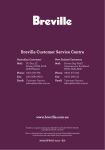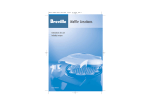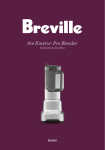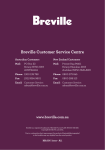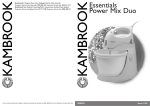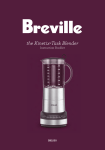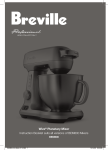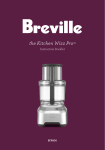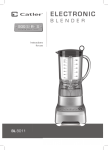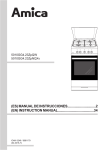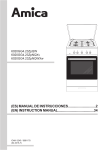Download Wizz™ Electronic Mixer Instructions and Recipes
Transcript
Wizz™ Electronic Mixer Instructions and Recipes to suit all BEM200 models Contents 2 Page Introduction 3 Breville recommends safety first 4 Know your Breville Wizz™ Electronic Mixer 6 Assembly and operation of your Breville Wizz™ Electronic Mixer 7 Care, cleaning and storing 10 Measuring and weighing 12 Mixing guide 13 Recipes R1 Notes IBC Congratulations on the purchase of your new Breville Wizz™ Electronic Mixer 3 Breville recommends safety first We at Breville are very safety conscious. We design and manufacture consumer products with the safety of you, our valued customer foremost in mind. In addition we ask that you exercise a degree of care when using any electrical appliance and adhere to the following precautions: Important safeguards for your Breville Wizz™ Electronic Mixer • Carefully read all instructions before operating the appliance and save for future reference. • Remove and safely discard any packaging material and promotional labels before using the appliance for the first time. • To eliminate a choking hazard for young children, remove and safely discard the protective cover fitted to the power plug of this appliance. • Do not place the mixer near the edge of a bench or table during operation. Do not use the mixer on a sink drain board. Ensure the surface is level, clean and free of water and other substances. Vibration during operation may cause the appliance to move. • Do not place this appliance on or near a hot gas or electric burner, or where it could touch a heated oven. • Always ensure the mixer is completely assembled before operating. The appliance will not operate unless properly assembled. • Ensure the Speed Control Dial is in the Off position and the mixer is switched off at the power outlet and the power cord is unplugged before attaching the beaters or dough hooks. • Do not use attachments other than those provided with the mixer. Use only the beaters and dough hooks supplied with the mixer. • In the unlikely event of an excessive load, do not operate the appliance continuously with excessive load for more than 30 seconds. Please note that none of the recipes in this instruction book are considered a heavy load. • Do not double the ingredients of the recipes as it can damage the appliance. 4 • Handle the mixer and attachments with care. Never place your fingers inside the mixing bowl or near the beaters or dough hooks during operation. • Keep hands, hair, clothing, as well as, spatulas and other utensils away from moving beaters or dough hooks during operation. • Should an object such as a spoon or spatula fall into the bowl while mixing, immediately ensure the Speed Control Dial is in the ‘Off’ position, turn the mixer off, unplug at the power outlet and remove the object. • Do not place hands in the mixing bowl unless the mixer is disconnected from the power outlet. Ensure the Speed Control Dial is in the ‘Off’ position, the mixer is switched off and unplugged from the power outlet before removing the beaters or dough hooks. • Ensure the motor and beaters or dough hooks have completely stopped before disassembling. • Always remove the beaters or dough hooks from the mixer before cleaning. • Care should be taken when removing the food from the mixer bowl by ensuring the motor and the beaters or dough hooks have completely stopped before disassembling. Ensure the Speed Control Dial is in the ‘OFF’ position, the appliance is switched off at the power outlet and unplugged before unlocking the Mixer Motor Head and moving into the upright position. The beaters and dough hooks should be released from the Mixer Motor Head before attempted to remove the processed food from the mixer bowl and the beaters or dough hooks. Breville recommends safety first • Ensure the Mixer Motor Head is locked into the horizontal (closed) position when not in use and before storing. • Always ensure the Speed Control Dial is in the ‘Off ’ position, the power is switched off at the power outlet and the power cord is unplugged from the power outlet before attempting to move the appliance, before assembling or disassembling the mixer, when the mixer is not in use and before cleaning or storing. • Do not move the mixer whilst in operation. • Do not leave the mixer unattended when in use. • Do not place any part of the mixer in the dishwasher or microwave oven. • Keep the appliance clean. Follow the cleaning instructions provided in this book. Important safeguards for all electrical appliances • Unwind the power cord fully before use. • Do not let the cord hang over the edge of a bench or table, touch hot surfaces or become knotted. • To protect against electric shock do not immerse cord, plug or mixer in water or any other liquid. • The appliance is not intended for use by persons (including children) with reduced physical, sensory or mental capabilities, or lack of experience and knowledge, unless they have been given supervision or instruction concerning use of the appliance by a person responsible for their safety. • Children should be supervised to ensure that they do not play with the appliance. • Any maintenance other than cleaning should be performed at an authorised Breville Service Centre. • This appliance is for household use only. Do not use this appliance for anything other than its intended use. Do not use in moving vehicles or boats. Do not use outdoors. Misuse may cause injury. • The installation of a residual current device (safety switch) is recommended to provide additional safety protection when using electrical appliances. It is advisable that a safety switch with a rated residual operating current not exceeding 30mA be installed in the electrical circuit supplying the appliance. See your electrician for professional advice. • It is recommended to regularly inspect the appliance. Do not use the appliance if power cord, power plug or appliance becomes damaged in any way. Return the entire appliance to the nearest authorised Breville Service Centre for examination and/or repair. ENSURE THE SPEED CONTROL DIAL CONTROL IS IN THE ‘OFF’ POSITION, THE MIXER IS SWITCHED OFF AT THE POWER OUTLET AND UNPLUGGED FROM THE POWER OUTLET BEFORE ATTACHING THE BEATERS OR DOUGH HOOKS. 5 Know your Breville Wizz™ Electronic Mixer Mixer head Turbo button for extra burst of power Eject button for release of beaters/dough hooks Speed control dial with 12 speed settings Mixer release lever Mixing beaters Tilt back locking button Mixer stand Revolving turntable Large 4.0L stainless steel mixing bowl Small 1.8L stainless steel mixing bowl Dough hooks 6 Assembly and operation of your Breville Wizz™ Electronic Mixer Before first use Before assembling your Breville Wizz™ Electronic Mixer, remove and safely discard any packaging material and promotional labels. Ensure the Speed Control Dial is in the ‘OFF’ position and the appliance is switched off at the power outlet and the power cord is unplugged. Wash the mixing bowls, beaters and dough hooks in warm, soapy water with a soft cloth. Rinse and dry thoroughly. Mixing bowls may also be washed in the dishwasher. When first using your Breville Wizz™ Electronic Mixer, you may notice and odour coming from the motor. This is normal and will dissipate with use. Once the motor head is securely locked onto the mixer stand it can be tilted away from the bowl by pressing the tilt back locking button and lifting it back to a 45 degree angle. Make sure the motor head is securely attached to the mixer stand before using. The mixer should not be used as a hand mixer. It must always be used on the stand. Attach the revolving turntable 1. Attach the revolving turntable to the mixer stand by fitting the revolving turntable into the socket corresponding to the size of the bowl selected (Fig 2). The turntable should spin around freely. Assembling the mixer 1. Place the mixer stand on a level, dry surface such as a bench top. Ensure the mixer stand is in the horizontal position. 2. Attach the motor head to the mixer stand by pressing and holding down the mixer release lever at the back of the mixer stand. Position the metal pin on the underside of the motor head to fit into the groove made when pressing down the mixer release lever [Fig 1). When the motor head is in position, release the lever. Fig 2 Fig 1 7 Assembly and operation of your Breville Wizz™ Electronic Mixer continued Attaching the beaters Attaching the dough hooks 1. Attach the beaters by pressing the tilt back locking button and lifting the motor head up until it stops (Fig 3). 1. Attach the dough hooks by pressing the tilt back locking button and lifting the motor head up until is stops (Fig 5). Fig 5 Fig 3 2. Insert the beaters into the correct socket as shown on the underside of the mixer head. The beaters should be inserted with a slight twisting action until they click firmly into place (Fig 4). left Fig 4 RIgHt 2. Insert the dough hooks into the correct socket as shown on the underside of the mixer head. The dough hooks should be inserted with a slight twisting action until they click firmly into place. It is important that the two dough hooks are fully inserted into their appropriate sockets or your Breville Wizz™ Electronic Mixer will not operate correctly. INSeRt CoRReCt BeateR It is important that the two beaters are fully inserted into their appropriate sockets or your Breville Wizz™ Electronic Mix will not operate correctly. THE BEATERS / DOUGH HOOKS MUST BE INSERTED INTO THE CORRECT SOCKET AS THEY ARE NOT INTERCHANGEABLE AND INCORRECT INSERTION WILL RESULT IN DAMAGE. 8 Assembly and operation of your Breville Wizz™ Electronic Mixer continued Operating the mixer Turbo boost function 1. Ensure that the speed control dial is set to the ‘OFF’ position and that the motor head is securely attached to the mixer stand before using. Pressing the ‘Turbo’ button while mixing provides an extra burst of power, overriding the speed setting being used. Press the ‘Turbo’ button and hold it down for no more than 30 seconds to avoid overheating. 2. Add ingredients to the mixing bowl supplied as listed in the recipe. 3. Insert the power cord into a 230/240V power outlet and switch the power ‘ON’. Commence mixing by turning the speed control dial clockwise. Always begin mixing at a lower speed setting to prevent splattering. Increase to the speed suited to the mixing task. The speed setting can be adjusted during operation by turning the dial forwards and back. Use the mixing guide as a reference, align the speed setting with the indicator arrow on the mixer, or between numbered settings. Always turn the Wizz™ Electronic Mixer ‘OFF’ if you need to scrape the bowl during use. Then continue mixing. 4. Occasionally stop the mixer during operation and scrape any food mixture down the sides of the mixing bowl with a spatula. 5. When mixing is complete, turn the speed control dial to the ‘OFF’ position. Switch the appliance off at the power outlet and unplug the power cord. 6. Press the ‘Tilt Back Locking’ button and tilt motor head back on the mixer stand. 7. Remove the beaters/dough hooks by pressing the eject button while grasping the shafts. The beaters/dough hooks will be released automatically. DO NOT try to pull the beaters/ dough hooks out of the sockets. Use a spatula to remove mixture from the beaters/dough hooks. AVOID CONTACT WITH BEATERS/DOUGH HOOKS DURING OPERATION. KEEP HANDS, HAIR, CLOTHING, SPATULAS AND OTHER UTENSILS AWAY FROM BEATERS/DOUGH HOOKS TO PREVENT INJURY OR DAMAGE TO THE MIXER. 9 Care, cleaning and storing your Breville Wizz™ Electronic Mixer Cleaning after use 1. Always ensure that the Speed Control Dial is in the ‘OFF’ position and that the power is switched off at the power outlet. Then remove the power cord from the power outlet. 2. Eject the beaters/dough hooks from the mixer. 3. To remove the motor head for cleaning, press the mixer release lever and lift the motor head from the mixer stand (Fig 6). 7. Do not allow the mixing bowls/beaters/dough hooks to soak in water for an extended period of time, as this may damage the metal finish. Do not use abrasive scouring pads or cleaners when cleaning the mixing bowls/ beaters/dough hooks as these may scratch the surface. Also ensure that the mixing bowls/beaters/dough hooks are not soaked in water for extended periods of time, i.e. for several hours or overnight, as this may damage the metal finish. Do not wash or soak the mixer stand in water or any other liquid. Clean with a damp soft cloth and dry thoroughly. Do not allow water or any liquid to enter the gear system as damage may result. Fig 6 4. Wipe the motor head, mixer stand and revolving turntable with a soft, damp cloth then dry thoroughly. 5. Wipe any excess food particles from the power cord. 6. Wash the mixing bowls, beaters and dough hooks in warm soapy water with a soft clean cloth. Rinse and dry thoroughly. Mixing bowls may also be washed in a dishwasher. NEVER IMMERSE THE MIXER, POWER CORD OR PLUG IN WATER OR ANY OTHER LIQUID. 10 Care, cleaning and storing your Breville Wizz™ Electronic Mixer continued Storage Your Breville Wizz™ Electronic Mixer should be kept in a convenient position on your kitchen bench top or in an accessible cupboard. Always unplug your Breville Wizz™ Electronic Mixer from the power outlet before storing. Place the revolving turntable in the small bowl position. Store the mixing bowls on the turntable with the small bowl sitting in the large mixing bowl. Place the beaters and dough hooks inside the small bowl and lower the motor head into the horizontal position. 11 Measuring and weighing Care should be taken when weighing and measuring ingredients to achieve accuracy and consistency. Australian metric measurements ml 1 teaspoon 5 1 tablespoon 20 1 cup 250 For New Zealand customers - New Zealand metric measurements ml 1 teaspoon 5 1 tablespoon 15 1 cup 250 The New Zealand tablespoon is 5ml less than the Australian tablespoon, so care should be taken when measuring ingredients to compensate for the variance. For example: 1 Australian tablespoon = 1 New Zealand tablespoon + 1 New Zealand teaspoon. It is also important to note that some New Zealand ingredients, especially flour and yeast, can differ from Australian equivalents. Metric weighing scales For consistent results it is recommended that a set of metric weighing scales be used to weigh larger quantities as they provide greater accuracy than measuring cups. Tare (zero) the scales with the container in position then spoon or pour ingredients in until the desired weight is achieved. In general, water weighs the same in grams as it measures in millilitres. 12 Metric measuring cups and spoons If using graduated metric measuring cups, it is important to spoon the dry ingredients loosely into the required cup. Do not tap the cup on the bench or pack the ingredients into the cup unless otherwise directed. Level the top of the cup with a knife. When using graduated metric measuring spoons, level the top of the spoon with a straight edged knife or spatula. DO NOT USE TABLEWARE CUPS OR SPOONS. Metric liquid measuring jugs If using a graduated, metric measuring jug, place jug on a flat surface and check for accuracy at eye level. DO NOT USE TABLEWARE JUGS OR MEASURING CUPS. Mixing guide SPEED SETTING MIXING TASK FOR 1-3 Folding in / Light blending Scones, Pastry, Quick Tea Cakes, Bread Dough 4-6 Light mixing Sauces, Puddings, Custards, Icings, Packet Mixes 7-9 Creaming / Beating Butter and Sugar, Cream Cheese, Heavy Batters 10-12 Whipping / Aerating Beating Cream, Egg Whites / Meringues, Marshmallow ISSUE TIP CHOICE OF BEATERS • Use beaters for all mixing / whipping tasks. • Use dough hooks only for preparation of yeast / bread doughs • DO NOT use a dough hook with a beater – this will damage the Breville Wizz™ Electronic Mixer. SPEED SETTINGS • Use the mixing guide to help select correct mixing speed when preparing recipes. • Begin mixing at lowest speed, then increase to higher speed to prevent splattering. MIXING • Mix for the recommended time in the recipe – avoid over mixing. • Should an object such as a spoon or spatula fall into the bowl while mixing, immediately switch the Breville Wizz™ Electronic Mixer off, unplug at the power outlet and remove the object. EGG WHITES • Be sure beaters and bowls are completely clean and dry before use – a small amount of fat will affect the whipping performance. BREAD DOUGH • Add the liquid ingredients before the dry ingredients. • Mix using Speed 3 to combine ingredients then reduce to Speed 1 and mix to knead dough. • DO NOT place hands near dough hooks when mixer is operating. 13 Recipes Contents Page Eggs R3 Batters R7 Scones R10 Cakes R12 Desserts R16 Biscuits R19 Bread R20 Notes R21 R2 Eggs French-style Ham, Herb & Cheese Souffle Omelette Crab & Dill Souffle Serves 2-4 2 tablespoons Parmesan cheese, finely grated 60g butter 1 shallot, finely sliced 11⁄2 tablespoons plain flour 1 cup milk 4 x 60 eggs, separated 180g can crab meat, drained ½ cup cheddar cheese, grated 1 tablespoon prepared tomato salsa 1 tablespoon dill, chopped ¼ teaspoon salt, if desired 2 tablespoons butter 120g ham, thinly sliced 2 tablespoons chives, finely chopped 1 tablespoon parsley chopped 1 medium tomato, sliced 4 x 60g eggs, separated 2 tablespoons milk 1 teaspoon French mustard ½ teaspoon salt ½ cup tasty cheese, grated 1. Melt butter in frypan on medium heat. 2. Saute the ham, chives, parsley and tomato for 2 minutes. Remove from frypan and keep warm. 3. Place egg yolks, milk, mustard and salt in the small mixing bowl and beat on Speed 2 until combined. Serves 2-4 1. Lightly grease a 3 cup soufflé dish, sprinkle with Parmesan cheese to form a light cheese crust. 2. Melt butter in a saucepan over medium heat and sauté shallots for 1 minute. 3. Add flour, cook, stirring for 1 minute. Remove pan from heat. 4. In the large mixing bowl beat egg whites on Speed 12 until soft peaks form. 4. Gradually add milk, stirring continuously until smooth and thickened 5. Fold beaten egg whites through the egg yolk mixture. 5. Combine egg yolks with crab meat and remaining ingredients then stir into prepared sauce. 6. Reheat the frypan to a medium heat. 7. Pour egg mixture evenly into the frypan and cook until omelette puffs and the base is crisp and golden. 6. Beat egg whites in the small bowl on Speed 12 until stiff peaks form. 7. Fold beaten egg whites into crab meat sauce. 8. Sprinkle omelette with the reserved ham mixture. Fold omelette in half and sprinkle with grated cheese. Slice into four even-sized portions. 8. Pour mixture over the back of spoon into prepared soufflé dish. Serve immediately with crisp French bread. Serve immediately with salad. R3 9. Bake in a moderate oven 180ºC for 45 minutes or until cooked and golden brown. Eggs SMOKED SALMON CREAMED SCRAMBLED EGGS SPINACH, EGG & BACON PIE Serves 2 ½ quantity Rough Puff Pastry (Page R9) 1 onion, finely chopped 1 cup bacon, chopped 1 cup baby spinach, roughly chopped 6 x 60g eggs Salt and pepper, to taste 4 x 60g eggs ½ cup thickened cream Freshly ground black pepper, to taste 2 tablespoons butter 150g smoked salmon, roughly chopped 2 tablespoons chives, finely chopped 1. Place eggs and cream in the small mixing bowl and beat on Speed 2 until light and fluffy. Season with pepper. 2. Melt butter in frypan. Pour egg mixture into hot pan and stir until mixture has thickened slightly. 3. Stir in chopped salmon and cook until eggs are set. Serve hot with buttered toast and garnished with chives. Serves 6 1. Roll out sufficient pastry on a lightly floured board to line deep 20cm x 30cm lamington pan. Do not prick the pastry. 2. Blind bake * in a hot oven 200ºC for 10-15 minutes. Remove blind baking material and allow pastry to cool. 3. Sprinkle onion, bacon and spinach evenly over pastry case. 4. Place eggs in the small bowl and beat on Speed 3 until light and creamy. 5. Carefully pour beaten eggs into the prepared pastry case. 6. Bake in a moderately hot oven 200ºC for 40 minutes or until set and golden brown. Serve hot or cold, cut into squares. *Blind baking Loosely cover the pastry with baking paper than pour in sufficient dried lentils or rice to hold the paper in place. This is to stop the pastry rising in the first baking. Retain the dried lentils or rice for future blind baking use. R4 Batters SUGAR AND SPICE PIKELETS CRÊPES Makes 24 Makes 10-12 2 cups plain flour 2 teaspoons baking powder ¼ cup brown sugar 1 teaspoon ground ginger ½ teaspoon cinnamon ¼ teaspoon mixed spice 2 x 60g eggs, lightly beaten 1 tablespoon honey 1 cup milk 45g butter, melted 1½ cups plain flour ¼ teaspoon salt 3 x 60g eggs, lightly beaten 1 cups milk 2 tablespoons butter, melted 1 tablespoon butter, for greasing 1. Sift flour, baking powder, sugar and spices into the small mixing bowl. 3. Increase to Speed 3 and beat well until smooth. Do not aerate. 2. Using Speed 2 gradually add eggs, honey, milk and butter. 4. Transfer batter to a jug for easier pouring. 3. Increase to Speed 3 and beat until consistency is creamy and smooth. 4. Allow mixture to stand for 5 minutes before using. 5. Pour level tablespoons of mixture about 4cm apart onto a preheated lightly greased frying pan, we recommend Breville’s BCP200 - Crêpe Creations™, pictured. 6. Cook over a medium heat until bubbles start to burst on top surface. Turn and cook second side until golden. Serve with jam and whipped cream. 1. Sift flour and salt into the small mixing bowl. 2. Using Speed 2 gradually add eggs, milk and melted butter 5. Heat a small crêpe pan, we recommend Breville’s BCP200 - Crêpe Creations™, pictured, or a non-stick frying pan. Add a small amount of butter for greasing, swirl around pan as it melts then remove by wiping with thick layers of paper towel. 6. Pour sufficient batter into pan and swirl to thinly cover. Pour off any excess. 7. Cook for 20-30 seconds over medium heat. Turn crêpes over and lightly brown the other side. Transfer to a plate and keep warm. 8. Continue cooking the remaining batter in this manner, greasing the pan when necessary with remaining butter. Serve warm, sprinkled with caster sugar and drizzled with lemon juice. BCP200 - Crêpe Creations™ R5 Batters WAFFLES PANCAKES Makes 6-8 1 cup plain flour ¼ teaspoon salt 1 x 60g egg 1 cups milk 2 tablespoons butter, softened 1 tablespoon butter, for greasing 2¼ cups plain flour 2¼ teaspoon baking powder ¼ teaspoon salt 3 x 60g eggs, separated 3 tablespoons caster sugar 1 cups milk 125g butter, melted 1. Sift flour, baking powder and salt into the large mixing bowl. 2. Using Speed 2 gradually add the egg yolks, sugar, milk and butter. 3. Increase to Speed 3 and beat well until smooth. Do not aerate. 4. Beat egg whites in the small mixing bowl on Setting 12 until stiff peaks form. 5. Fold beaten egg whites into the waffle batter. 6. Preheat and lightly grease a waffle maker, we recommend Breville’s WM800B - Waffle Creations™, pictured or jaffle iron. 7. Pour sufficient waffle mixture into each waffle mould. Cook until waffles are set and easily removed. Serve warm, drizzled with maple syrup or honey. 1. Sift flour and salt into the small mixing bowl. 2. Using Speed 2 gradually add the egg, milk and butter 3. Increase to Speed 3 and beat well until smooth. Do not aerate. 4. Transfer batter to a jug for easier pouring. 5. Heat a non-stick frying pan or we recommend Breville’s BPC100 - Pancake Creations™, pictured. Add a small amount of butter for greasing and swirl around pan as it melts. 6. Pour sufficient batter into pan for desired size of pancakes. 7. Cook over a medium heat until bubbles start to burst on top surface. Turn and cook second side until golden. Transfer to a plate and keep warm. 8. Continue cooking the remaining batter in this manner, greasing the pan when necessary with remaining butter. Serve warm, with fruit and ice cream. WM800B - Waffle Creations™ BPC100 - Pancake Creations™ R6 Batters CRISPY BATTER TEMPURA BATTER ½ cup plain flour ¼ cup cornflour 1 teaspoon baking powder ¼ teaspoon salt ¾ cup milk 1 x 60g egg ½ cup plain flour ½ cup cornflour 250ml/1 cup water 1. Sift flour, cornflour, baking powder and salt into the small mixing bowl. 1. Place egg into the small mixing bowl and beat on Setting 2 until thick and creamy. 2. Using Speed 3, gradually add milk. Beat until smooth. Do not aerate. 2. Using Speed 3, gradually add flours and water into two batches. Beat until smooth. Do no aerate. 3. Allow the batter to rest for 10 minutes before using. 3. Allow the batter to rest for 10 minutes before using. 4. Stir in a little extra milk if the mixture becomes too thick. 4. Stir in a little extra water if the mixture becomes too thick. Use crispy batter to coat fish fillets and potato scallops for deep frying. Use Tempura batter to coat vegetables or prawns for deep frying. BEER BATTER 1 cup plain flour ½ teaspoon salt ¼ teaspoon pepper, ground ½ cup flat beer 1 x 60g egg white, lightly beaten 1. Place all ingredients into the small mixing bowl. 2. Using Speed 3, combine until smooth. Do not aerate. 3. Allow the batter to rest for 20 minutes before using. 4. Stir in a little extra flat beer if the mixture becomes too thick. Use beer batter to coat fish or vegetables for deep frying. R7 Pastry RICH SHORTCRUST PASTRY SWEET PASTRY 180g butter, chopped 2 ¼ cups plain flour 1 ½ teaspoons baking powder ¼ tablespoon salt 2 tablespoons lemon juice 1 x 60g egg yolk, lightly beaten 125g butter, chopped 2 tablespoons caster sugar 1 x 60g egg, separated ¼ cup custard powder ¼ cup cornflour ¾ cup plain flour ¾ cup self raising flour 2 tablespoons lemon juice 1 tablespoon iced water 1. Cream butter using Speed 3 until soft. 2. Sift flour, baking powder and salt together. 3. Using Speed 1, gradually add seasoned flour alternately with combined lemon juice and egg yolk until a soft dough forms. 1. Cream butter and sugar on Speed 3 until smooth, add egg and beat until well combined. 4. Knead dough lightly on a lightly floured bench, wrap in plastic wrap and refrigerate until firm. 2. Using Speed 1 gradually add custard powder and flours. Add combined lemon juice and water until a soft dough forms. Use as required. 3. Knead dough lightly on a lightly floured bench, wrap in plastic warp and refrigerate until firm. CHOUX PASTRY Use as required. Makes 20 small puffs or 12 eclairs 100g butter 1¼ cups water 1 cup plain flour 3 x 60g eggs, lightly beaten 1. Place butter and water into a medium saucepan and bring to the boil. 2. Remove from heat and quickly stir in flour. 3. Continue stirring over medium heat until dough forms and leaves the side of the saucepan. 4. Remove from heat and place into the large mixing bowl. Push pastry to spread around bowl and allow to cool for 5 minutes. 5. Place large mixing bowl onto mixer and using Speed 3 add eggs one at a time and continue mixing until pastry is shiny and glossy. Use immediately for Chocolate Eclairs or Cream Puffs. R8 Pastry ROUGH PUFF PASTRY 100g butter, chopped in 4 portions 1 x 60g egg yolk 1 cup plain flour ½ teaspoon baking powder 1 tablespoon lemon juice 2 tablespoons water 1. Cream 25g of the butter on Speed 3 until smooth, add egg and beat until well combined. 2. Using Speed 1 gradually add flour and baking powder. Add combined lemon juice and water until a soft dough forms. 3. Knead dough on a lightly floured board and roll into a rectangle 1cm thick. 4. With the narrow end of the rectangle facing, dot two-thirds of the pastry with 25g of the butter. Fold the unbuttered one-third of pastry and then fold again. Refrigerate for 5 minutes. 5. Roll this buttered pastry again into a rectangle 1cm thick and repeat Step 4. 6. Repeat the rolling and folding with the remaining portions of butter and once without, refrigerating as required. 7. Roll to shape and size, cover with plastic warp and store in the refrigerator. Use as required. R9 Scones PLAIN SCONES PUMPKIN SCONES Makes 12 Makes 12 50g butter, chopped 2 cups self raising flour ¼ teaspoon salt 1 cup/250ml milk Extra milk, for glazing 60g, butter chopped 2 tablespoons sugar 1 x 60g egg 1 cup mashed cooked pumpkin, well drained, cooled 2 cups self raising flour 1 teaspoon cinnamon ¼ teaspoon salt ¼ cup milk 1. Cream butter in small mixing bowl using Speed 3 until soft. 2. Sift flour and salt together. 3. Using Speed 3 gradually add the flour and milk alternatively until a soft dough forms. (Stop the mixer, raise and lower the beaters when necessary to assist with the mixing). Do not over mix. 4. Turn dough onto a lightly floured board, knead lightly and press or roll dough to desired thickness. 5. Cut scone shapes in dough by using a sharp edged scone cutter or knife dipped in flour. For straight-sided well-risen scones, cut straight down with the scone cutter, do not twist. 6. Place scones close together onto a lightly greased or baking paper lined lamington pan or oven tray. 7. Lightly brush top of each scone with milk. 8. Bake in a hot oven 200ºC for 10 – 15 minutes or until cooked and golden. 1. Cream butter in the small mixing bowl using Speed 3 until soft 2. Using Speed 3, add sugar and egg, mix until well combined, then gradually add pumpkin 3. Sift flour, cinnamon and salt together. 4. Using Speed 1, gradually add the spiced flour and milk alternately until a soft dough forms. (Stop the mixer and raise and lower the beaters when necessary to assist with the mixing). Do not over mix. 5. Turn dough onto a lightly floured board, knead lightly and press or roll dough to desired thickness. 6. Cut scone shapes in dough by using a sharp edged scone cutter or knife dipped in flour. For straight-sided well risen scones, cut straight down with the scone cutter, do not twist. 9. Turn out onto a wire rack to cool. 7. Place scones close together onto a lightly greased or baking paper lined lamington pan or oven tray. Serve hot or cold, with butter and jam. 8. Lightly brush the top of each scone with milk. 9. Bake in a hot oven 220ºC for 10 - 15 minutes until cooked and golden. 10.Turn out onto a wire rack to cool. Serve hot or cold, buttered. R10 Scones WHOLEMEAL SCONES CHEESE AND BACON SCONES Makes 8 40g butter, chopped 2 cups self raising flour, sifted 1 x 40g pkt French onion soup mix 1 cup/250ml skim milk Extra milk, for glazing 3 rashers bacon, rind removed finely diced ¾ cup finely grated Cheddar cheese 50g butter chopped 2 tablespoons honey 1½ cups self raising flour ½ cups wholemeal self raising flour ½ teaspoon mixed spice 1 teaspoon cinnamon ¾ cup milk Extra milk, for glazing 1. Cream butter and honey in the small mixing bowl using Speed 7 until soft 2. Sift flours, mixed spice and cinnamon together. 3. Using Speed 2, gradually add the spiced flour and milk alternately until a soft dough forms. (Stop the mixer and raise and lower the beaters when necessary to assist with the mixing). Do not over mix. 4. Turn dough onto a lightly floured board, knead lightly and press or roll dough to desired thickness. 5. Cut dough into eight round scone shapes using a sharp edged knife dipped in flour. Cut a cross marking on the top of each scone. 6. Place scones close together onto a lightly greased or bake paper lined lamington pan or oven tray. 7. Lightly brush top of each scone with milk. 8. Bake in a hot oven 220ºC for 15-20 minutes or until cooked. 9. Turn out onto a wire rack to cool. Serve hot or cold, with honey. R11 1. Cream butter in the small mixing bowl on Speed 7 until soft. 2. Using Speed 2, gradually add the flour, soup mix and milk alternately until a soft dough forms. (Stop the mixer and raise and lower the beaters when necessary to assist with the mixing). Do not over mix. 3. Turn dough onto a lightly greased or bake paper lined oven tray and mark into 8 equal pie-shaped portions. 4. Bake in a hot oven 220ºC for 15-20 minutes or until cooked. 5. Turn out onto a wire rack to cool. Serve hot or cold, buttered or with soup. Cakes BASIC BUTTER CAKE VANILLA ICING 125g butter, softened ¾ cup castor sugar ½ teaspoon vanilla essence 2 x 60g eggs 2 cups self raising flour ½ cup milk 1 quantity Vanilla Icing 20g butter, softened 1 cup icing sugar 1 teaspoon vanilla essence 1 – 2 tablespoons warm milk 1. Cream butter and sugar in the small mixing bowl on Speed 7 until light and fluffy. 1. Combine butter, icing sugar, vanilla and milk in the small mixing bowl on Speed 1. 2. Increase to Speed 4 and mix until smooth. Use as required. 2. Add vanilla then eggs one at a time, beating well after each addition, until well combined. 3. Using Speed 3, gradually add flour and milk alternately into creamed mixture, mix until smooth. 4. Poor mixture into a well greased and baselined 23cm loaf pan. 5. Bake in a moderate oven 180ºC for 45 minutes or until cooked and golden brown. 6. Turn out onto a wire rack to cool. 7. When cold, ice with Vanilla icing or dust with icing sugar. Great cake base to decorate kids party cakes. FRUITY TEA CAKE 1 cup mixed dried fruit, chopped ¾ cup light brown sugar, firmly packed 2 tablespoons butter 1 cup/250ml boiling water 2¼ cups self-raising flour 1 teaspoon cinnamon ½ teaspoon mixed spice 2 x 60g eggs Icing sugar, for dusting 1. Combine the fruit, sugar, butter and water in the large bowl and mix well on Speed 1, cool slightly. 2. Sift flour, cinnamon and mixed spice together. 3. Using Speed 3, add eggs one at a time into the fruit mixture then gradually add spiced flour until well combined. 4. Spoon the mixture into a lightly greased and base-lined 20cm square or round pan. 5. Bake in a moderate oven 180ºC for 45 minutes or until cooked and golden brown. Cool for 5 minutes, turn out and cool on rack. 6. Cool for 5 minutes, turn our and cool on rack. 7. When cold, dust lightly with icing sugar. R12 Cakes BANANA LOAF APPLE AND CINNAMON TEACAKE 125g butter, melted ½ cup sugar 2 x 60g eggs 1 teaspoon vanilla essence 1 teaspoon lemon rind, grated 2 ripe medium bananas, peeled and mashed 1½ cups self raising flour ½ cup milk 180g butter, chopped ½ cup light brown sugar, firmly packed 2 teaspoons grated lemon rind 4 x 60g eggs 1 ¼ cups self raising flour 1 teaspoon cinnamon ½ cup milk 2 apples, peeled, cored and sliced 2 tablespoons cinnamon sugar 1. Cream butter and sugar in the small mixing bowl on Speed 7 until light and fluffy. 2. Using Speed 3 add eggs one at a time, then gradually add vanilla, lemon rind and mashed bananas. 3. Gradually add flour and milk alternately then continue beating for 5 minutes. 4. Pour into a lightly greased and base lined 23cm loaf pan. 5. Bake in a moderate oven 180ºC for 25-30 minutes or until cooked and golden brown. 6. Cool for 5 minutes, turn out and cool on rack. 7. When cold, ice with Cream Cheese Frosting. CREAM CHEESE FROSTING 40g butter, softened ¼ cup cream cheese, softened 1 teaspoon lemon juice 1 cup icing sugar, sifted 1. Cream butter, cream cheese and lemon juice in the small mixing bowl on Speed 7 until light and fluffy. 2. Using speed 4, gradually add icing sugar and mix until smooth. Use as required. R13 1. Cream butter and sugar in the small mixing bowl on Speed 7 until light and fluffy, beat in rind. 2. Using Speed 3 add eggs one at a time, beating well after each addition 3. Sift flour and cinnamon together. 4. Gradually add spiced flour and milk alternately to creamed mixture, continue beating for 5 minutes. 5. Lightly grease a 20cm spring form pan. 6. Layer half of the apple slices on the base of the pan, sprinkle with 1 tablespoon cinnamon sugar. 7. Pour half of the prepared cake mixture over the apples, layer remaining apple, sprinkle with remaining cinnamon sugar then cover with remaining cake mixture. 8. Bake in moderate oven 180ºC for 60 minutes until cooked and golden. 9. Cool for 5 minutes, turn out and cool slightly on rack. Serve warm with whipped cream. Cakes NEVER FAIL PLAIN SPONGE 4 x 60g eggs, separated ¼ cup castor sugar 1 cup self raising flour 3 tablespoons water 1. Beat egg whites in the small mixing bowl on Speed 12 until stiff peaks form. 2. Gradually add sugar and beat until thick and glossy. Add egg yolks and beat well. 3. Sift flour. 4. Using Speed 1, gradually add flour and water alternately, beat until smooth. Do not over mix. 5. Divide mixture evenly between the two greased, floured and base-lined 20cm cake pans. 6. Bake in a moderate oven 180ºC for 15-20 minutes or until cake springs back when touched and comes away slightly from sides. 7. Cool for 10 minutes, turn out and cool on rack. 8. Spread middle and top of cake with fresh strawberries and whipped cream. Sponge cakes are best served on the day made as they do not store well due to low fat content. R14 Cakes CHOCOLATE SPONGE Chocolate Glace Icing 40 x 60g eggs, separated ¾ cup castor sugar 1 cup self raising flour, sifted 50g cooking chocolate, melted 3 tablespoons water 2 cups icing sugar 1 tablespoon cocoa 20g butter, softened 1-2 tablespoons warm water Cream Filling 2. Combine with butter and water in the small mixing bowl and beat on Speed 1. 300ml thickened cream ¼ teaspoon cocoa 2 teaspoons honey Icing 1 quantity Chocolate Glace Icing 1. Beat egg whites in the small mixing bowl on Speed 12 until stiff peaks form. 2. Gradually add sugar and beat until thick and glossy. Add egg yolks and beat well. 3. Sift flour 4. Divide mixture evenly between two greased, floured and base-lined 20cm cake pans. 5. Bake in a moderate oven 180ºC for 10-15 minutes or until cake springs back when touched and comes away slightly from the sides. 6. Cool for about 10 minutes, turn out and cool on rack. 7. Place Cream Filling ingredients into the cleaned small mixing bowl and beat on Speed 12 until soft peaks form. 8. When cake is cold, turn one sponge half over and spread with Cream Filling. 9. Cover top of other sponge half with Chocolate Glace Icing then place on top of Cream Filling. R15 1. Sift icing sugar and cocoa together. 3. Increase to Speed 4 and mix until smooth and glossy. 4. Use immediately. Sponge cakes are best served on the day made as they do not store well due to low fat content. Desserts BUTTERSCOTCH SELF SAUCING PUDDING Serves 2 50g butter, chopped 1 ½ cups light brown sugar, firmly packed ¾ cup self raising flour, sifted ½ teaspoon mixed spice 2 ⁄3 cup milk 30g butter, extra ¼ cup sugar ¼ cup water 2 tablespoons water, extra 1. Lightly grease 6 x 1 cup capacity ovenproof dishes. 2. Cream butter and sugar in the small mixing bowl on Speed 7 until light and creamy. 3. Using Speed 3, gradually add the flour and mixed spice alternately with milk, mix until smooth. 4. Pour mixture evenly into prepared dishes. 5. Combine remaining butter, sugar and water in a small saucepan and bring to the boil. 6. Reduce heat, simmer gently uncovered until golden brown. 7. Remove from heat and carefully stir in 2 tablespoons of water until smooth, cool slightly. 8. Pour mixture over each pudding. 9. Bake in a moderate oven 180ºC for 25 minutes or until cooked. 10.Loosen each pudding by running a knife around the edge then carefully invert dish on a serving plate. The butterscotch sauce will pour over the pudding as it is released from the dish. LEMON LIME DELICIOUS Serves 2 60g butter ¾ cup castor sugar 1 teaspoon lemon rind, grated ½ teaspoon lime rind, grated 3 x 60g eggs, separated 1 ⁄3 cup self raising flour, sifted ¼ cup lemon juice ¼ cup lime juice 1 cup milk 1. Lightly grease a 5-cup capacity ovenproof dish. 2. Cream butter and sugar in the small mixing bowl on Speed 7 until light and fluffy. Beat in lemon and lime rinds. 3. Using Speed 3, add egg yolks one at a time, beat well after each addition. 4. Gradually add the flour, juices and milk alternately, mix until smooth. 5. Pour mixture into the large mixing bowl and wash the small mixing bowl and beaters. 6. Beat egg whites in the small mixing bowl on Speed 12 until stiff peaks form 7. Use Speed 1 to fold whipped egg whites through prepared mixture. 8. Pour mixture into the prepared ovenproof dish. 9. Place the ovenproof dish into a large baking pan. Pour enough hot water into the pan to come half way up the sides of the dish. 10.Bake in a moderate oven 180ºC for 1 hour or until cooked and golden. Serve warm with whipped cream sprinkled with extra lemon and lime rind. Serve hot, with clotted cream. R16 Desserts BAKED VANILLA CUSTARD TART CHOCOLATE ÉCLAIRS Serves 6 1 quantity Choux Pastry (Page R8) 1 Quantity Cream Filling (Page R15) or whipped cream 1 Quantity Chocolate Glace icing (Page R15) ½ quantity Sweet Pastry (Page R8) 4 x 60g eggs ½ cup castor sugar 1 tablespoon cornflour 1 ½ cups milk, warmed 2 teaspoons vanilla essence ½ teaspoon cinnamon, ground ½ teaspoon nutmeg, ground 1. Roll out sufficient pastry on a lightly floured board to line a 23cm flan pan. Do not prick the pastry. Place the flan pan onto a baking tray and blind bake* in a hot oven 200ºC for 10 – 15 minutes. Remove blind baking material and allow pastry to cool. 1. Place Choux Pastry mixture into a large piping bag fitted with large star pipe. 2. Pipe 10cm strips of mixture onto lightly greased oven trays that have been lightly sprinkled with water. 3. Bake in a moderately hot oven 200ºC for 30 minutes or until puffy and golden. 4. Reduce temperature to 120ºC and continue to bake for 10-15 minutes or until éclairs appear dry. 5. Turn out onto a rack and cool. 2. Place eggs and sugar in the small bowl and beat on Speed 3 until light and creamy. 6. When cold, use a sharp knife to cut slits into one side of each éclair. 3. Blend cornflour with milk and vanilla essence, then stir into egg mixture. 7. Fill with cream filling and drizzle tops with Chocolate Glace Icing. 4. Carefully pour thickened milk mixture into the prepared pastry. Sprinkle with spices. 5. Bake in a hot oven 200ºC for 10 minutes. 6. Reduce temperature to 180ºC and bake for a further 20 minutes or until custard is set. Allow to cool before serving. *Blind baking Loosely cover the pastry with baking paper then pour in sufficient dried lentils or rice to hold the paper in place. This is to stop the pastry rising in the first baking. Retain the dried lentils or rice for future blind baking use. R17 Desserts PAVLOVA COCONUT MANGO CHEESECAKE Serves 4-6 250g packet plain sweet biscuits, finely crushed ½ cup desiccated coconut 150g butter, melted 3 x 60g egg whites 3 tablespoons water 1 cup castor sugar 1 teaspoon white vinegar 1 teaspoon vanilla essence 3 teaspoons cornflour Whipped cream and passionfruit pulp, for serving Filling 3. Beat egg whites in the small mixing bowl on Setting 12 until stiff peaks form. 250g packet light cream cheese, softened 300ml sour cream 1 x 300ml can coconut milk 3 x 60g eggs ¼ cup Malibu liquor ½ cup desiccated coconut ¼ cup caster sugar ¼ cup cornflour 1 ripe fresh mango, peeled and sliced or 200g frozen mango cheeks, thawed 4. Add water and continue beating. Gradually add sugar until well combined. 1. Combine biscuit crumbs, coconut and butter in a large bowl, mix well 5. Using Speed 3, add vinegar, vanilla and cornflour. 2. Press biscuit crumb mixture over the base and sides of a lightly greased and base lined 22cm springform pan. Refrigerate for 20-30 minutes. 1. Line a baking tray with baking paper and draw a 20cm circle in the middle. 2. Preheat oven at 150ºC 6. Spread mixture into circle on prepared bake paper. Smooth top surface and sides of pavlova shape. 7. Bake in slow oven 150ºC for 45-50 minutes. Turn off oven and allow pavlova to cool in oven. 8. Carefully slide pavlova from bake paper onto serving dish. Decorate with whipped cream and drizzle with passionfruit pulp. 3. Beat cream cheese, sour cream and coconut milk in the large mixing bowl on Speed 3 until smooth, add eggs one at a time, then gradually add liqueur. 4. Using Speed 1, gradually add coconut, sugar and cornflour until combined. Increase to Speed 3 and mix until smooth. 5. Place prepared pan onto a baking tray and pour half of filling carefully into crumb crust, layer mango slices then pour in remaining filling. 6. Bake in a moderate oven 180ºC for 1 hour or until filling is just set. Allow cheesecake to cool in oven with door ajar. 7. Cover cheesecake with foil and refrigerate for several hours or overnight. Serve dusted with sifted icing sugar and tropical fruits. R18 Biscuits CHOCOLATE CHIP BISCUITS GINGER KISSES 125g butter, softened ¼ cup castor sugar ¼ cup sweetened condensed milk ¼ teaspoon vanilla essence 1½ cups plain flour 1 teaspoon baking powder ½ cup chocolate chips 125g butter, softened ½ cup sugar 2 x 60g eggs 1 cup plain flour 1 cup cornflour 1¼ teaspoons baking powder 1 teaspoon ground ginger 1 quantity Butter Icing 1. Cream butter and sugar in the small mixing bowl on Speed 7 until light and fluffy. Beat in condensed milk and vanilla essence. 2. Sift flour and baking powder together. 3. Using Speed 3, gradually add dry ingredients and chocolate chips, mix until well combined. 4. Roll tablespoons full of the mixture into balls. Place balls 4cm apart on a lightly greased or baking paper lined baking tray. Press balls gently with a floured fork to flatten slightly. 5. Bake in a moderately hot oven 180ºC for 15-20 minutes or until crisp and golden brown. 6. Remove from oven, set aside to crispen, transfer to rack to cool completely. 1. Cream butter and sugar in the small mixing bowl on Speed 7 until light and fluffy. Add eggs one at a time, mixing well after each addition. 2. Sift flour, cornflour, baking powder and ground ginger together. 3. Using Speed 3, gradually add dry ingredients, mix until well combined. 4. Place teaspoonsful of the mixture 4cm apart on a lightly greased or baking paper lined baking tray. 5. Bake in a hot oven 200ºC for 10-12 minutes or until cooked but not brown. 6. Remove from oven, allow biscuits to cool on tray and then transfer to rack to cool completely. 7. Sandwich two biscuits together with Butter Icing. BUTTER ICING 100g butter, softened ½ teaspoon vanilla essence 2 cups icing sugar, sifted 1-2 tablespoons warm water 1. Cream butter in the small mixing bowl on Speed 1 until light and fluffy. Beat in vanilla, icing sugar and warm water. 2. Increase to Speed 4 and mix until smooth. 3. Use as required. R19 Bread BASIC WHITE BUTTERMILK BREAD COUNTRY DAMPER 1 cup/250ml buttermilk, warmed 1 x 60g egg, lightly beaten ¼ cup olive oil 3½ cups bread or baker’s flour 1 teaspoon sugar 2 teaspoons dried yeast 1¼ cups water 2 tablespoons oil 4 cups/600g bread or baker’s flour 2 tablespoons baking powder 2 tablespoons milk powder 1 tablespoons sugar 2 teaspoons salt 1. Using the dough hooks, combine milk, egg, oil, flour, sugar and yeast in the large mixing bowl on Speed 3, scraping the sides until the mixture pulls together. 2. Using Speed 1, knead the dough until smooth and elastic about 1-2 minutes. Add 1-2 teaspoons water if the dough becomes too dry. 3. Turn dough out onto a lightly floured board and knead until soft and pliable. 4. Place dough in a lightly oiled bowl, cover loosely and place in a warm area for 30-40 minutes or until dough doubles in size. 5. Punch risen dough down and knead into the required shaped for loaf. 6. Place dough into a 23cm x 12cm greased loaf pan, loosely cover and place in a warm area until dough has risen to fill the pan. 1. Using the dough hooks, combine all ingredients in the large mixing bowl on Speed 3, scraping the sides of the bowl until the mixture pulls together. 2. Using Speed 1, knead the dough until smooth and elastic about 1-2 minutes. Add 1-2 teaspoons water if the dough becomes too dry. 3. Turn dough out onto a lightly floured board and knead gently into a round shape. 4. Place dough into a 23cm round greased pan. 5. Bake in moderately hot oven 200ºC for 50-60 minutes or until crust is brown and bread sounds hollow when tapped. 6. Serve warm with butter and golden syrup. ENSURE THE MIXER IS SWITCHED OFF AND UNPLUGGED FROM THE POWER OUTLET BEFORE REMOVING THE BEATERS AND ATTACHING THE DOUGH HOOKS. R20 Notes R21 Notes Breville is a registered trademark of Breville Pty. Ltd. ABN 98 000 092 928 Breville Customer Service Centre Australian Customers ) Breville Customer Service Centre PO Box 22 Botany NSW 2019 AUSTRALIA % Customer Service: 1300 139 798 Fax (02) 9384 9601 Email Customer Service: [email protected] New Zealand Customers ) Breville Customer Service Centre Private Bag 94411 Greenmount Auckland, New Zealand % Customer Service: 09 271 3980 Fax 0800 288 513 Email Customer Service: [email protected] www.breville.com.au © Copyright. Breville Pty. Ltd. Wizz™ is a trademark of Breville Pty. Ltd. Due to continual improvements in design or otherwise, the product you purchase may differ slightly from the one illustrated in this booklet. Model BEM200 Issue C10




































